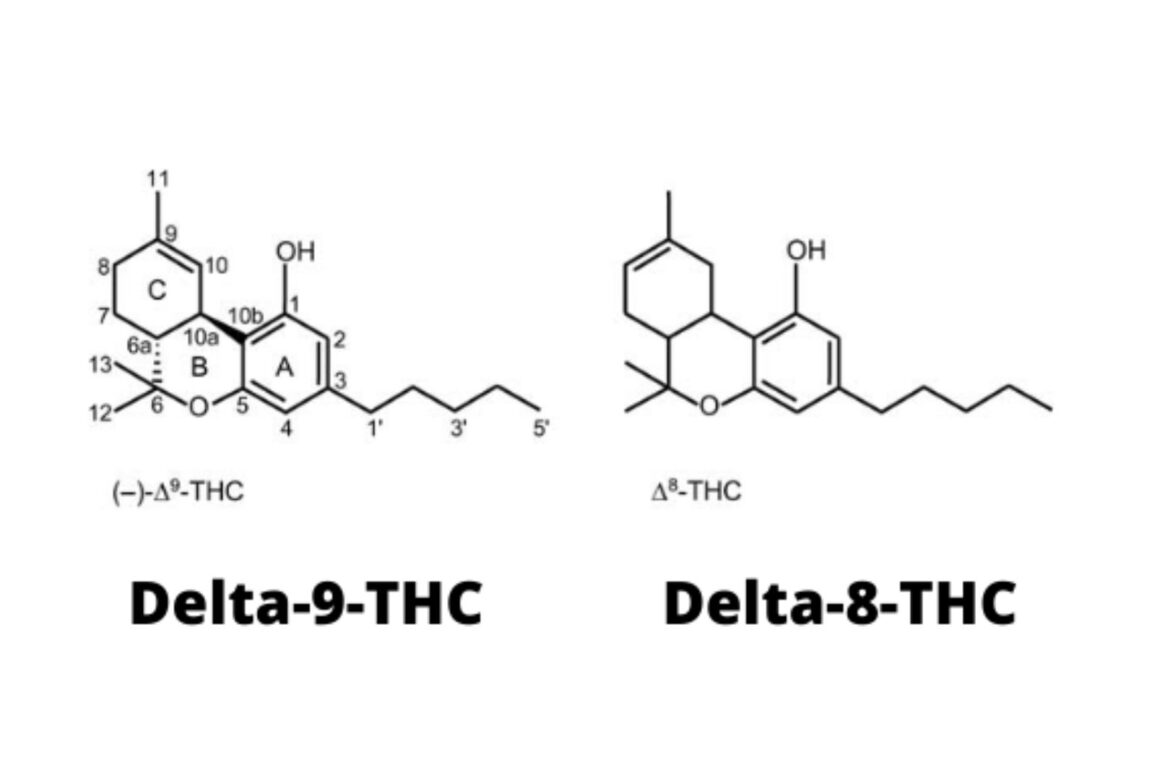Introduction: In light of the growing popularity of cannabis products, it is important to understand what contributes to their effects. Cannabis contains two well-known compounds, delta 8 THC and delta 9 THC. Despite their similarities, they possess distinct characteristics that separate them. In this blog, we will explore what is the the differences between delta 8 THC and delta 9 THC, including their potential benefits, risks, legal status, and more.
Table of Contents:
- What Is Delta-8 THC?
- What Is Delta-9 THC?
- Can Delta-8 Show Up on a Drug Test?
- Are Delta-8 THC and Delta-9 THC Legal?
- How Do Delta 8 and Delta 9 Differ Legally?
- Is Delta 9 Stronger Than Delta 8?
- Does Delta 9 Get You Higher Than Delta-8?
- How Long Will Delta 8 Stay in Your System for a Drug Test?
- What Is the Difference Between Delta 8 and Delta 9?
What Is Delta-8 THC?
Cannabis plants naturally contain delta-8 tetrahydrocannabinol, or THC, a cannabinoid. Cannabis’ more well-known and prevalent psychoactive compound, delta 9 THC, is structurally similar to this compound. Its milder psychoactive effects have led to a growing interest in delta-8 THC due to its milder effects than delta-9 THC
Potential Benefits: A number of potential health benefits may be associated with delta-8 THC, just as they are with delta-9 THC. Users have reported experiencing relaxation, mood enhancement, and mild pain relief. It may also stimulate appetite and alleviate nausea, similar to delta 9 THC.
Potential Risks: However, delta-8 THC can still cause impairment, even if it has milder psychoactive effects. Delta-8 THC consumption at high doses can lead to an increased intoxication and negative effects, although individual experiences may vary.
What Is Delta-9 THC?
Cannabis’ primary psychoactive compound is delta-9 THC, commonly referred to as just THC. Cannabis users experience a “high” when they use it. The psychoactive effects of Delta 9 THC are derived from its interactions with cannabinoid receptors in the brain and central nervous system.
Potential Benefits: The potential therapeutic benefits of Delta 9 THC are well known. In certain medical conditions, such as cancer and HIV/AIDS, it may reduce pain, reduce nausea and vomiting, stimulate appetite, and alleviate symptoms. Research also suggests its potential use in managing anxiety and sleep disorders.
Potential Risks: While delta-9 THC offers potential benefits, it is important to recognize that it can have adverse effects. These may include anxiety, paranoia, impaired memory and cognition, increased heart rate, and potential dependency with prolonged heavy use. Individual sensitivity to delta 9 THC can vary, and these effects may be more pronounced in some individuals.
Can Delta-8 Show Up on a Drug Test?
Although delta-8 THC is chemically similar to delta 9 THC, standard drug tests typically do not specifically detect delta-8 THC. Delta 9 THC, or one of its metabolites, is the primary target of most drug tests. Some sensitive tests can detect Delta-8 THC, leading to a positive result. A drug test can be avoided by using THC products.
Are Delta-8 THC and Delta-9 THC Legal?
Depending on the jurisdiction, delta-8 and delta-9 THC have different legal statuses. In some regions, delta-8 THC is considered legal, while in others, it may fall under the same regulations as delta 9 THC. It is essential to research and understand the specific laws and regulations in your area before purchasing or using any THC products.
Where Do Delta 8 and Delta 9 Come From? Both delta 8 THC and delta 9 THC are derived from the same precursor compound, cannabigerolic acid (CBGA), found in cannabis plants. Through different chemical processes, CBGA is converted into either delta-8 THC or delta 9 THC.
How Do Delta 8 and Delta 9 Differ Legally?
The legal distinction between delta 8 THC and delta 9 THC varies and can be complex. In some jurisdictions, delta-8 THC is considered legal when derived from hemp plants with a THC concentration below a specific threshold. However, regulations can differ, and it is crucial to review local laws and regulations to understand the legal status of these compounds in your area.
Is Delta 9 Stronger Than Delta 8?
In terms of its psychoactive effects, delta-9 THC is typically considered stronger than delta-8 THC. Delta 9 THC has a higher binding affinity to the cannabinoid receptors in the brain, leading to more potent and noticeable intoxicating effects. As compared to delta-9 THC, delta-8 THC provides a milder high
Does Delta 9 Get You Higher Than Delta-8?
Yes, delta 9 THC is generally known to produce a more potent and noticeable psychoactive effect compared to delta-8 THC. A more intense “high” results from delta 9 THC’s stronger affinity for cannabinoid receptors in the brain. Delta-8 THC, on the other hand, is reported to produce a more subtle and less intoxicating effect.
How Long Will Delta 8 Stay in Your System for a Drug Test?
The duration for which delta-8 THC can be detected in the body depends on various factors, including frequency of use, dosage, metabolism, and the type of drug test conducted. As with delta 9 THC, it is generally advisable to assume that delta-8 THC can be detected in standard drug tests for a few days to several weeks after use.
What Is the Difference Between Delta 8 and Delta 9?
The main difference between delta 8 THC and delta 9 THC lies in their chemical structures and psychoactive effects. Delta 8 THC has a double bond on the eighth carbon atom of the THC molecule, whereas delta 9 THC has a double bond on the ninth carbon atom. This slight variation in structure contributes to the differences in their overall effects, potency, and binding affinity to cannabinoid receptors.
While delta-8 THC and delta-9 THC share some similarities, they possess distinct characteristics that differentiate them from each other. Delta-8 THC offers a milder psychoactive experience compared to delta 9 THC, with potential benefits and risks of its own.
Understanding the differences between these compounds, their legal status, and potential effects is essential for individuals considering their use. As with any cannabis product, it is advisable to consult with a healthcare professional before incorporating delta-8 THC or delta-9 THC into your wellness routine.
Disclaimer – The contents of this article are provided solely for informational purposes and should not be considered medical advice. It is important to note that the information presented here is not meant to diagnose, treat, cure, or prevent any disease. Prior to embarking on any new health-related regimen, Always consult your healthcare provider before trying new supplements or treatments. Keeping you safe and well is our top priority. Additionally, it’s important to note that the FDA has not endorsed any claims regarding the health benefits of cannabis. Delta8Hub makes no guarantees or warranties regarding the accuracy, completeness, or usefulness of any messages contained here in.

